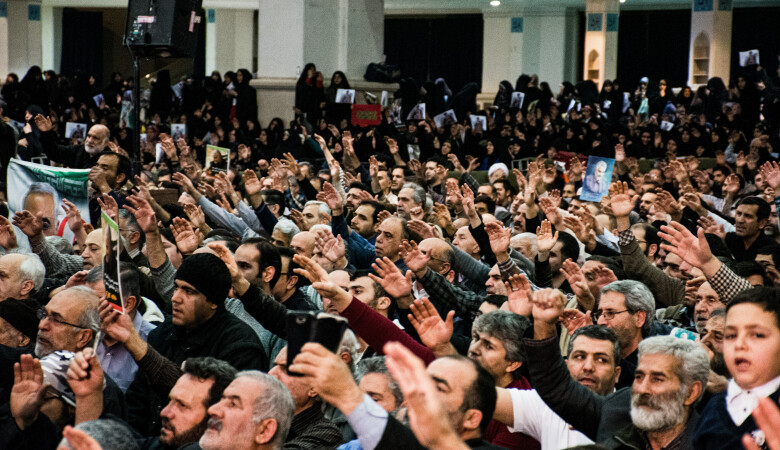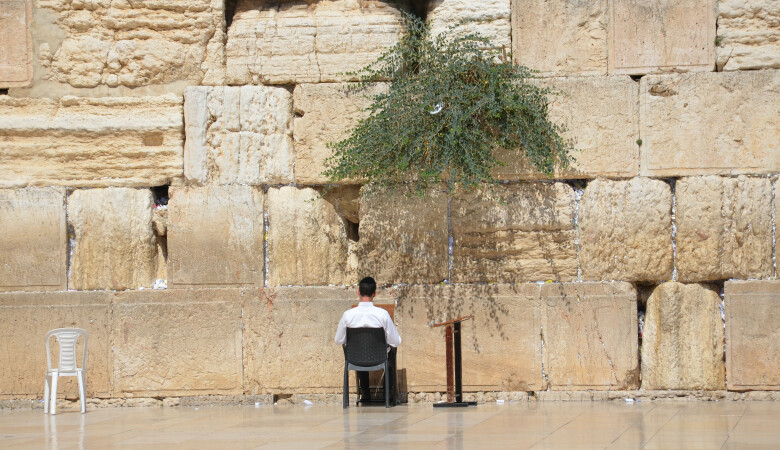Series: Mark
Mountain-Moving Prayer (Mark Sermon 57)
August 20, 2023 | Andy Davis
Mark 11:20-25
Abiding in Christ, Prayer
It is important to ask for great things from God, seeking by faith to perceive what God wills to do and by prayers to be involved in his work.
- SERMON TRANSCRIPT -
Turn in your Bibles to Mark 11. We resume a series now in the Gospel of Mark, and the focus, as you heard in my prayer today, is Mountain-Moving Prayer. On Wednesday, May 30th, 1792, at Friar Lane Baptist Chapel in Nottingham, England, a simple cobbler named William Carey preached one of the greatest sermons in church history. It was later called the Deathless Sermon. It was a call for Christians to make every effort to take the gospel to unreached peoples to the ends of the earth and to the end of time. Up to that point in history, missionaries had usually been Roman Catholic, often Jesuits who are taking Roman power to distant lands, but not the pure gospel. Christians who had rediscovered the gospel through the reformation led by Martin Luther, John Calvin, and others had, up to that point, not really gotten that involved in foreign missions. William Carey would be a pivotal leader in the history of Protestant missions and would himself be part of the solution when he boarded a ship and went to Kolkata, India.
William Carey's deathless sermon was broken into two main headings. Number one, expect great things from God, and number two, attempt great things for God. Since that time, at the close of the 18th century, the true gospel has spread to every political nation on earth and the number of genuine Christians all over the world has exploded beyond all boundaries. We don't know how can we know how many are truly born again, but the number may be 500 million, 700 million, a billion, 1.5 billion. We don't know, but it's astonishing. Compared to that, the moving of a physical mountain into the depths of the sea is as nothing. I'm going to take liberties with our brother, William Carey. I don't think he'll mind me adding a third heading to the sermon. I'm not trying to improve on a deathless sermon. How could I?
Certainly, we should expect great things from God, but before we can attempt great things for God, I think, based on the text I'm going to preach today, we should ask great things of God. That links the two. Expecting great things, asking great things, attempting great things. I don't think William Carey would mine. Mountain-moving prayer links our expectations, great expectations with great actions. Look at the text, “'Have faith in God.’ Jesus answered. ‘I tell you the truth, if anyone says to this mountain, go throw yourself into the sea, and does not doubt in his heart, but believes that what he has said will happen, it will be done for him. Therefore, I tell you, whatever you ask in prayer, believe that you have received it, and it will be yours.’” The passage is stunning. Jesus uses lavish language to charge his people to ask God to do mighty things and answer to prayer. So let's set the context.
I. From a Withered Fig Tree to a Fruitful Church
We're moving from a withered fig tree to a fruitful church. It is the last week of Jesus's life. Lots of dramatic moments are happening, beginning with the triumphal entry into Jerusalem. “Hosanna! Hallelujah to the son of David. Blessed it is the coming kingdom of our father, David,” all of that. He goes to the temple, scouts it out. But because it's so late, He goes out of the city to Bethany. The next morning, He goes back in to cleanse the temple, to purify the temple of all that wickedness. En route, He sees this fig tree. Look at verses 12 -14. "The next day, as they were leaving Bethany, Jesus was hungry, seeing in the distance of fig tree and leaf. He went to find out if it had any fruit. When he reached it, he found nothing but leaves because it was not the season for figs. Then he said to the tree, ‘May no one ever eat fruit from you again,’ and his disciples heard him say it.”
Now, Jesus' hunger was both physical and prophetical. Jesus represented his father, and this fig tree symbolized Israel. God wanted fruit from Israel from centuries of him pouring out blessings on that nation. But the tree had only leaves, just as Israel had only an appearance of spiritual vitality, but without any genuine fruit in the sight of God. It represented essentially a spiritually dead Israel. So Jesus cursed the tree in a massively significant prophetical action. Prophets did this kind of thing, these kind of symbolic actions. The cursed fig tree died instantly, but not apparently so, not in appearance. Moments after Jesus cursed it, it looked the same. Just like the nation of Israel had leaves and would continue seemingly apparently alive for decades before God finally brought the hammer blow down through the Romans in A.D. 70, destroying the temple. So, immediately after the cursing, it looks fine, but the next morning radically different. The moment Jesus cursed it, it died. But the next morning, it became apparent that that's what had happened. The following morning, Peter noticed and remembered, look at verse 20-21, "In the morning, as they went along, they saw the fig tree withered from the roots. Peter remembered and said to Jesus, ‘Rabbi, look the fig tree, you cursed is withered.’" There's nothing miraculous about a fig tree withering, but there is something miraculous about that happening after powerful words spoken by the son of God, and hours later it looks like it's been dead for years. Now that's a miracle, and the disciples wanted to understand it. In Matthew's Gospel, they asked the question, how did the fig tree wither so quickly? That's the issue. So Jesus at that moment pivots to teach about faith-filled prayer.
On the surface, this may seem a bit strange. How did the fig tree wither so quickly? Have faith in God and ask great things in prayer. What's the connection? How do we understand why that lesson at that moment? I think the connection, the link, is fruit. The reason that the fig tree was cursed was fruitlessness. The reason that God would judge Israel was the same fruitlessness. He's about to tell a parable of a vineyard that He's going to give this same lesson on the issue of fruit. In that parable, Jesus speaks of a vineyard planted by an owner. The owner works the soil thoroughly, plants the vines, puts a wall around it, digs out a wine press, and builds a watchtower. Then he rents out the vineyard to some tenant farmers and leaves. But when he sends messengers to collect his share of the fruit, they beat one, kill another, stone a third. Last of all, he sends a son, and they kill him too. In Matthew's telling of that parable, Jesus sums it all up. Matthew 21:43, "Therefore, I tell you, the kingdom of God will be taken away from you." He says to his enemies, "And given to a people who will produce its fruit." Friends, that's us. That's our job. It's given to the church, both Jews and Gentiles, believers in Christ. It's given to us to produce the fruit of the kingdom, and that fruit will only come about by the power of Almighty God, and that expressed in prayer as we pray.
I want you to take a minute, put your finger here in Mark, and go over to John 15, and we're going to look at verses 5-8. This is a phenomenal cross-reference. Usually, cross-references are okay, give them a B+ for connection. But this is a top to bottom cross-reference connection here. The lesson of the withered fig tree and the issue of fruitfulness is overtly and clearly taught in John 15:5-8. Look what it says. Jesus said, "I am the vine. You are the branches. If anyone remains in me, and I in him, he'll bear much fruit. Apart from me, you can do nothing. If anyone does not remain in me, he's like a branch that is thrown away and what withers. Such branches are picked up and thrown into the fire, and burned. If you remain in me and my words remain in you, then ask whatever you wish, and it will be given to you. This is to my Father's glory that you bear much fruit, showing yourselves to be my disciples." Surely you must see the points of connection here. It's an agricultural image, that's true, not a fig tree in this case, but a vine with branches. But this goal is the same. It's fruit. A fruitless branch is severed from the vine, thrown to the ground. It withers, and it's thrown to the fire and burned, judgment. Branches that remain in Jesus, people like you and me that stay close to Jesus are intimately connected with him through repentance and faith and are alive in him and stay connected with him. We abide in him. We can pray. If we have God's word saturating our minds, we will know what to pray for. We're not guessing here. God will tell us in his word, what we should pray for, and as we are saturating God's Word, if we remain in him and his words dwell, or abide, or remain in us, then we will ask according to his will, we'll ask whatever we wish, and it will be done for us. In this way, we'll bear the fruit of the kingdom that He talked about.
Go back to Mark now, and you see those same lessons. This is a new lesson for his apostles, they were not prayer warriors up to this point. They were not men of prayer. He says in John 16:24, "Until now, you have not asked for anything in my name. Ask and you'll receive, and your joy will be complete." You've not learned this lesson to pray. They're about to be commissioned to go into all the world and be fishers of men, and build the kingdom of God to the ends of the earth. They've got to be men of prayer. So He says in John 14:12-14, "I tell you the truth, anyone who has faith in me will do what I have been doing. He will do even greater things than these because I am going to the Father, and I will do whatever you ask in my name so that the son may bring glory to the Father." You may ask me for anything in my name, and I'll do it. It's prayer. It's prayer. Again and again, it's prayer.
There are lots of mountains to be moved from Jerusalem through Judea, and Samaria to the ends of the earth. Lots of mountains had to be moved. People's hearts would have to be changed. The heart of stone removed, the heart of flesh given. People would have to cross over from death to life, and there'd be practical aspects of the spread of the gospel, obstacles that would have to be overcome or moved out of the way. Lots of mountains would have to be moved, and only the Holy Spirit could move them, and He would do it in answer to faith-filled prayer, Mountain-Moving Prayer. That's why Jesus went from the dead fig tree to a lesson on prayer.
II. Walking Through Jesus’ Words
So let's walk through it now. Let's look at the words. Let's just go step by step through what He says. I'll read them again, beginning at verse 22. "Have faith in God. I tell you the truth, if anyone says to this mountain, go throw yourself into the sea, and does not doubt in his heart but believes that what he has said will happen, it will be done for him. Therefore, I tell you, whatever you ask for in prayer, believe that you have received it, and it will be yours. And when you stand praying, if you hold anything against anyone, forgive him that your Father in heaven may forgive you your sins.”
Just walk through it, it begins with the statement, “have faith in God.” Jesus points his disciples to Almighty God as the focus of their lives and especially the focus of their prayer. Focus on God. Faith is the eyesight of the soul, by which you see the invisible God on his throne. Focus on that. Have faith in him. Everything comes from God. For him and through him and to him are all things in his hand is every blessing you want. He opens his hand and satisfies the desires of every living thing. Have faith in the God who can give you what you want, what you need. Have faith in God. Then He says, "Truly, I say to you." Jesus says this from time to time. Everything Jesus said was true, but when he says, “truly, I say to you” or something like that, He's saying, pay attention. Take notice. This is a very important thing I'm about to say to you. Unusually significant, a solemn assertion. Then Jesus says, "If anyone says..." The doctrine He's about to give about prayer is universal; it's for all his followers, not just for the apostles, or for the super spiritual ones, or for the real super leaders, the great William Carey. It's for anyone and everyone. “If anyone says,” basically, in these words, He's going to give three universals. “If anyone says”... so it's any person and then, anything. Whatever you ask in prayer, you'll receive it. Amazing. And then, any unforgiven sin. If you hold anything against anyone, forgive him, these are universals. Sweeping statements “If anyone says.. .” Jesus is expanding our conception of prayer. God is able to immeasurably more than all we ask or imagine.
"God is able to immeasurably more than all we ask or imagine. "
Then He says, "If anyone says to this mountain, go throw yourself into the sea." Now this should not be taken literally. Some of you have literalistic minds, right? It's like, well, that's it. We believe in errancy, pastor. I do believe in errancy, but I also believe in figures of speech. This is a figure of speech. Jesus did this. He said to the Pharisees, “you strain out a gnat and swallow a camel.” I'm going to stop you right there, you literalist. That never happened. It's a metaphor. You're focused on tiny details, and you're missing the big picture. The mountain represents some massive obstacle to the plan of God. That's what the mountain represents. This mountain, was almost certainly the Mount of Olives, and just so you know from Zechariah 14, God has plans for the Mount of Olives, He doesn't want it moved and thrown into the sea. It's going to be the very place where Jesus will return at the second coming, so let's just leave that mountain right there. In any case, it's a metaphor, and it represents massive obstacles to the plan of God.
Then He says, "and does not doubt." Now we get to the issue of doubt. The enemy of faith is doubt. The essence of doubt is questioning God, questioning his existence. Is God even with us? Questioning his nature, questioning his word, did God really say this or that? Questioning his truthfulness to his promises, questioning his faithfulness, questioning his power, his goodness, his love, quavering, wavering on it, going back and forth. It's an essential instability, a rootless instability. James gives us this picture in James chapter 1:5, “But when he asks, he must believe and not doubt, because he who doubts is like a wave of the sea blown and tossed by the wind, that man should not think he'll receive anything from the Lord. He's a double-minded man, unstable in all his ways." That's the picture of doubt, isn't it? It's instability. It's like, I don't know, Will he? Won't he? Will it happen? I don't know. That's doubt.
Paul, the apostle, cites Abraham, our father in faith, as a powerful example of faith despite all obstacles. Romans 4:19-21, talking about how he was going to have a son in his old age and his wife, his barren wife, would have a son in her old age, and he's dealing with that promise, the promise from God. Paul writes this about Abraham, "Without weakening in his faith, Abraham faced the fact that his body was as good as dead. Since he was about a hundred years old and that Sarah's womb was also dead." That's scoping the mountain. Well, it's a big mountain. He's looking at it. He's facing the fact that's going to be, it's impossible actually if God doesn't work. "Yet he did not waver through unbelief regarding the promise of God." That's Romans 4:20. That's a clear description of doubt, wavering through unbelief like a flickering light bulb, "But was strengthened in his faith and gave glory to God, being fully persuaded that God had power to do what he had promised." That's the essence of faith-filled prayer. God has power to do what He has promised He will do. So Jesus says, If anyone has faith and does not doubt but believes that what he has said will happen, that he has said in prayer, you going to speak prayer, and it's going to happen. Instead of doubting, this prayer warrior really believes a mountain's going to be lifted up and thrown into the sea. God has the power to do anything. And he reasons, which is harder for God to make the mountain out of nothing or to move it from one place to the other? You think about that, if God can make a mountain out of nothing, He can move it from one place to the other, and every mountain that exists on planet Earth, God made out of nothing.
The prayer warrior believes that God has told him to pray for this. This mountain must move, and God has laid this burden on my heart. It is essential for this mountain to move for the kingdom of God to advance in this specific way that mountain's going to move. That's what faith and prayer is, is being a human channel of God's awesome power to do amazing things. The nature of faith therefore is perceiving and then receiving, perceiving then receiving. Perceiving the will of God as He has revealed it in scripture and in providence, and then receiving the will of God as He delivers it by his power and Jesus says, "It will be done for him."
Prayer accomplishes amazing things, mighty things, but it doesn't in and of itself accomplish anything. It's always God that does things through prayer. It's God that moves the mountain.
Your prayer didn't move anything. John Piper speaks of prayer in this way. "Prayer is the splicing of our limp wire to the lightning bolt of heaven." Isn't that a great image? Splicing your limp wires. Is your wire limp? Mine feels limp a lot. Splice that thing to the lightning of heaven and see what God will do. There's nothing mighty in prayer in and of itself. It's that God is mighty, and He answers prayer. Then Jesus gives a universal application in verse 24, "Therefore, I tell you, whatever you ask for in prayer, believe that you have received it, and it will be yours." It's awesome.
Then He goes to another topic, it seems, look at verse 25, "And when you stand praying, if you hold anything against anyone, forgive him so that your Father in heaven may forgive you your sins.” When I was memorizing the Gospel of Mark, this one verse stuck out to me more than any other of the 876 verses, or 676 verses, in this Gospel, this one verse. Let me be honest, just like any sinner, I can easily hold things against people. It's easy to be bitter. It's easy to remember the hurts that people have done in your life. Any of you like that? Any of you specifically know right now that this person, that person or the other person has hurt you and you're holding something against them? It's really very remarkable here. Jesus is here, giving you effectively emancipation proclamation of your own slavery to bitterness. He's telling you, let it go. Just like the parable of the 10,000 talents, you've been forgiven much. You must forgive. And look at how sweeping it is, "Whenever you stand praying, if you hold anything against anyone, forgive him." In other words, every time you pray, it's an opportunity to do that. “Search me, oh, God, and know my heart. Show me if I'm bitter against somebody. Show me if I'm upset at my mom or dad or my son or daughter or my brother, my sister, a fellow church member, a pastor, a spouse, a husband, a wife, a neighbor, a roommate, a person from my past.” You know the person. You know the group of people. Maybe you have a lot of them. Anytime you pray, it's an opportunity to obey this verse and be set free. Set free. Stop drinking the poison. You're just set free from bitterness.
Now you may wonder, what does it have to do with mountain moving, faith-filled prayer? It seems like an odd thing to go from verse 24 to 25, but not so much. Just keep in mind what is happening. The faith-filled, mountain-moving prayer is all about the building of the kingdom of God. How important would you say the forgiveness of sins will be in the kingdom of God? And is not that forgiveness going to be both vertical and horizontal? Are we not going to spend eternity in heaven with other sinners, some of whom we knew in life, and we'll be free, and there'll be no bitterness, there'll be nothing but sweet fellowship? So that's the kingdom Jesus is building, and He wants us to be set free and not harbor sin. An image on this came to me, I love Hebrews 4:16, it’s a great verse. It says, "Let us draw near to the throne of grace so that we may receive mercy and find grace to help in time of need.” Isn't that a great verse? The curtain and the temple, torn in two from top to bottom, is open. We have access to the throne of God. We're invited in this text to draw near to the throne of God, but before you enter the throne room of God, you got to give up your weapons. I watch the “Lord of the Rings” movies, some of you have as well. And in movie number two, a bunch of warriors are trying to get into the Hall of the King, Théoden, but they can't go in with their weapons. They have to leave their weapons at the door. That's the image I have here. You can't bring bitterness and unforgiveness to the throne of grace and expect to get anything from God. You got to let your weapons go. Now let me extend the image. I find it may be one of the hardest things there is to do in life. It's easy to hold onto bitterness. Have you ever heard of the expression nursing a grudge? What a weird thing to do to a grudge. I would kill the grudge, but instead we nurse it. Why? Because it puts us in a position of power. We can hold it over that person and be bitter toward them, and they can maybe walk on eggshells toward us and all that. Let it go. What's so beautiful is the one seated on the throne of grace, if we're having a problem, will come out to the doorway where we're having trouble giving up our weapons and say, “what's the problem here?" “Well, I want to come in, but they won't let me. I can see why they won’t.” “Can I help you with that? Can I help you get rid of that bitterness? Can I remind you that I forgave you all of that sin because you begged me to? Let it go. Let it go.” So that's walking through.
III. Elements of Mountain-Moving Prayer
Now, let's draw out elements of mountain-moving prayer. First of all, faith in God. Have faith in God. That has to do with history and theology. First of all, remember what God has done. Remember how Peter looked back and remembered that Jesus had cursed the fig tree? That's an issue of remembrance. Remember what God has done. Psalm 77:11-12, "I'll remember the deeds of the Lord. Yes, I'll remember your miracles of long ago. I will meditate on all your works and consider all your mighty deeds.” Think of God, the God of the Bible. Is there anything He cannot do? Think of the Red Sea crossing. Before that, think of creation. "In the beginning, God created heaven and earth." God can do anything. Look at his track record again and again and not just in the Bible, but look at his track record with you. How many of your prayers has He answered? George Mueller kept a record, a record book, 50,000 answers to prayer in connection with his care for 10,000 orphans over his life, 50,000 answers to prayer. He wrote them down, and that built and built and built his confidence in prayer, the specificity of it. So have faith in God, remember his mighty deeds, and think who God is.
What should you consider when you have faith in God? I would say these elements, first of all, God's glory. Pray in reference to God's glory. God does everything for his glory. Whether you eat or drink, whatever you do, do it all for the glory of God. What is that? The manifestation of the perfections of God. Pray that in this moving of this mountain that God may be displayed as a great, loving, kind, powerful God. That God may be put on display, the glory of God.
Secondly, God's omniscience. Keep in mind, God has already thoroughly studied the problem. He has all wisdom and knows exactly what to do. “Your father knows what you need before you ask him." [Matthew 6:8], or this Romans 11:33-34, "Oh, the depths of the riches and the wisdom and the knowledge of God! How unsearchable His judgments and his paths beyond tracing out! Who has known the mind of the Lord? Or who has been his counselor?" I'm going to say something in a minute about this, but let me tell you something. In prayer, you're not God's counselor. You do know that, don't you? It's not like, “God, let me tell you what I think you should do here.” We'll get to all that.
Next, God's sovereignty. God is sovereign and has meticulously crafted a plan that goes down to the tiniest detail of every day of redemptive history. He's already sovereignly, decreed his will. Ephesians 1:11 says, "In him we were also chosen, having been predestined according to the plan of him who works out everything in conformity with the purpose of his will." That's everything. God is sovereign. God's omnipotence. There is nothing that God cannot do. Is anything too hard for God? Isaiah 40:26:"Lift up your eyes and look to the heavens: Who created all these? He who brings out the starry host one by one and calls them each by name because of his great power and mighty strength, not one of them is missing." The power of God.
And then think of the goodness of God. God wants to do good things for his people. He wants that more than you do. Matthew 7:9-11 "Which of you, if his son asks for bread, will give him a stone? Or if he asks for a fish, will give him a snake? If you, then, though you are evil, know how to give good gifts to your children, how much more will your Father in heaven give good gifts to those who ask him!" God wants to give good gifts to us, and again, Romans 8:28, "We know that in all things, God works for the good of those who love God and are called according to his purpose." I've struggled my whole Christian life to understand the effectiveness of prayer. The prayer of a righteous man is powerful and effective, I'm told in James. I'm an engineer. I know what power and effect is. It means that I am a change agent. I'm a catalyst. I'm an earth mover, I guess, if I'm effective. That's not what effective prayer is. Prayer is not us, number one, teaching God a solution He hadn't thought of, or number two, persuading him to do something He didn't want to do before He talked to you. I know that that logically seems like effective prayer. It's like, it made a difference because I told God something He didn't know or I persuaded him to do something He wasn't going to do. That is not what powerful, effective prayer is all about. Rather, effective prayer is discerning what God has already determined to do and asking him to do it for His glory by his power. That's what effective prayer is. So putting it all together, whatever we pray, we do so mindful of God's glory and that is our top priority. God's omniscience in that God's already figured out what's best to do. God's plan, He's already decreed based on his wise plan. God's power, there's nothing He cannot do and God's goodness is in his desire to bless his people. We pray like that. He will give us anything we ask for.
"Effective prayer is discerning what God has already determined to do and asking him to do it for His glory by his power."
Now, what is the mountain that needs to be moved? Seeing the mountain that needs to be moved. “If you say to this mountain, go throw yourself in the sea, it will be done for you.” I said it's a specific obstacle to the spread of the gospel, a specific obstacle to the growth of the kingdom of God. That's what it is. So you could see that there's a specific government official somewhere withholding a visa, and he won't let some critical workers into a country because he is withholding a visa. It's a mountain that needs to be moved. Some prayer warrior praises until that individual, for some strange reason, changes his mind. That kind of stuff's happened again and again and again. Or a pastor being held at a restrictive nation, and the people of God pray, and he's released.
That happened in the Bible with Peter. They prayed, the people of God, were praying even after James had been executed. They kept praying for Peter, and he was released, an answer to prayer. Or with George Muller's specific physical needs for hundreds and hundreds of orphans. They need to eat today, give them this day their daily bread, and then stuff happens. Amazing. You don't want to be driving a bread truck by the orphanage when there's a need. Your truck's going to break down, and you'll have nowhere else to go with that bread except the orphanage, and God answers those prayers.
Now, what does it mean for us? What is our field? We are in the Raleigh/ Durham/ Chapel Hill area. We are positioned here by the wise plan of God. We're positioned here for the kingdom of God. We're positioned right here in Durham, this triangle area with the RTP and all that is attractive to people. People are moving in here in large numbers. Last night I went walking around all the restaurant areas. I walked all the way down to the Insomnia coffee or cookie place, I walked in there. There was no one there. I said, what time do you close? "3:00 AM.” Anyway, but there was no one working. That was interesting. Then I walked back, and as I was walking, I was thinking and praying. I was like, I wonder how many of these people are lost?
They're pouring in here. They're living in all those condos and houses and all that that are being built, and the overwhelming majority of them are unchurched. They're lost. Our mountain to be moved is within their hearts, their hatred for Christ, their opposition to God. They're thinking they don't need any of this. That's our field, that's our mountain. That we would see baptisms in numbers like we have never seen before, that people would be brought from death to life because we boldly attempted great things for God after the first two things happen, expected great things, and ask great things. That's our mountain to be moved. We ask God to do it. We keep on asking and it will be given to us. We keep on seeking, and we'll find. We keep on knocking, and the door will be opened. As Jesus said, He told the parable of the persistent widow that they should always pray and never give up.
I'm not a big fan of church sign ministry. Some of them are just cheesy. You know what I'm talking about. I mean, really bad, but I saw one that stuck with me. I really like it, “Pray until something happens." I love that. Doesn't it line up with this text? Pray until something happens. Keep praying until you see that mountain move. We expect God to answer. Mark 11:24, "I tell you, whatever you ask for in prayer, believe that you have received it, and it will be yours." Charles Spurgeon was talking to a young preacher about his lack of fruit and street evangelism. He preached again and again without seeing any converts at all. Spurgeon asked him, "Do you expect people to be converted every time you preach?" "No, sir." He said, "Well, that's the reason you don't succeed because you do not expect to do so. According to your faith, it will be done to you." Wow, Spurgeon's tough. Imagine him as your mentor. But what's our level of expectation? Do we expect to see people converted because of the witness of us?
Expect it, and then be humble about sin. The next time you go to pray, ask the Lord to show you. Are you holding anything against anyone? Are you bitter toward anyone? Ask the Lord to help you forgive and to release.
IV. Warnings Against Misunderstandings
I have a section of my sermon here on warnings against misunderstandings about the “name it and claim it” thing and all that. I'm not going to say any of it. You want to know, come and ask, and I'll tell you about Creflo Dollar and all those guys, but I just don't think that's our problem. I don't think we're “name it and claim it” people. We're under-utilizers of the promises in this text. That's the problem. We're erring on the side of not asking enough. So let's ask and see what God can do.
V. Lessons Applied to Us
So applications, first of all, to any that are here that are lost, you're on the outside looking in. You don't know this, not like you should, but your sins are like a mountain that has to be moved. Your sins are like a mountain between you and friendship with God, adoption into God's family. That mountain has to be moved, and if it's not moved, you cannot come into sweet fellowship with God. In Micah chapter 7, He has promised that He will take our sins and throw them into the depths of the sea, and you'll see them no more. All you have to do is call in the name of the Lord Jesus, know that He shed his blood to provide that ocean of grace, and trust in him. Call on the name of the Lord, and He'll move that mountain of your sins and throw it in the depths of the sea, and you'll see it no more.
For us as Christians, there's two applications: pray that we would pray. Let's start there. Pray that we'll become a praying church. That the obstacles to us praying like this would be removed, and that we pray as we have never prayed before, and that we would pray to fulfill the mission for which we have been positioned here in the Raleigh/ Durham/ Chapel Hill area, and that is the winning of lost people. Pray for that, and pray that we would be a sweet, gracious, and forgiving church. That whatever grievances we may have against each other, against anyone that we would readily, quickly forgive.
We're going to go now to a time of the Lord's Supper, so I'm going to close the sermon in prayer. Father, thank you for the things we've learned in Mark's Gospel about mountain-moving, faith-filled prayer. We thank you for that, and we pray now that as we experience the Lord's Supper, that you would be mighty in this place, giving us an encounter with God, the living God, through the Ordinance of the Lord's Supper. In Jesus' name, Amen.































